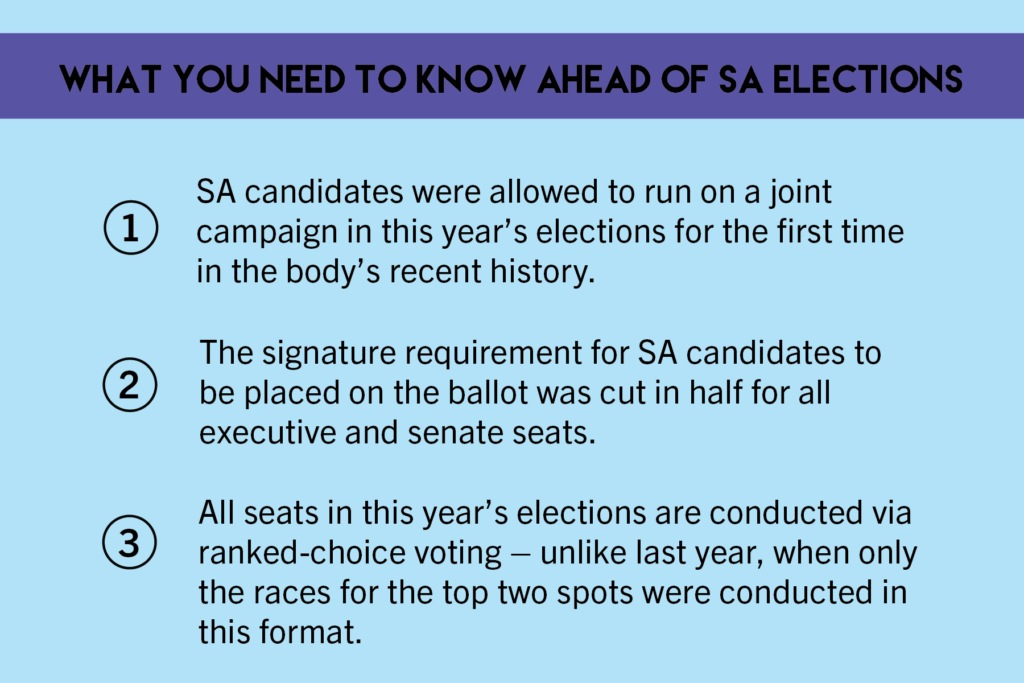Candidates will wrap up weeks of campaigning for entirely online Student Association elections this week.
Joint Elections Commission Chairperson Chloe Wagner said the commission – which oversees SA elections – changed campaigning rules this academic year to require all candidates to campaign solely in a virtual format, axing the use of campaign posters around campus. Wagner said this academic year all executive and senate races will be conducted via ranked-choice voting after using it only for executive races last year.
“We’re the ones doing all the behind-the-scenes work between making sure that everything goes smoothly online, transitioning things that work traditionally in person to making sure that we can have them function virtually,” Wagner said.
Here’s how the elections will look different from previous years:
Tweaking virtual elections rules
Wagner said the SA Senate passed a bill in November to update the body’s bylaw language and make elections guidelines “more clear.” The rules included for this year’s elections, like removing at-large positions from the race and decreasing the number of signatures required to make the ballot, will not remain in effect for future elections unless the senate votes to do so.
Senators cut the number of signatures required for each candidate for president and vice president from 500 to 250. The number of signatures required for senators varied based on what constituency they would represent.
The bill also allows candidates to run a joint campaign, creating website and social media pages together, but their names will appear separately on the ballot. The JEC previously declined to allow candidates to run on joint campaigns in prior years.
SA President Brandon Hill, running for another term, and SA Sen. Kate Carpenter, U-at-Large, and a candidate for vice president, announced their joint campaign last month.
Wagner said all of the positions in this year’s elections, including the senate seats, will be decided via ranked-choice voting – a system that allows voters to list their preferred candidates in order. The JEC conducted only the presidential and vice presidential elections via ranked-choice voting last year because of technology limitations for the senate races.
Increased messaging
She said the JEC is working to help students through the online elections process through emails sent to students explaining how to vote and instructions on the JEC website. She said an explanation about how ranked-choice voting works will also be included on each student’s ballot.
“As you’re voting, students will see this isn’t a regular election and will have the chance to learn more about what that voting experience is like,” Wagner said.
Wagner said students voiced concerns about the voting process after the initial 2020 elections results showed then-presidential candidate George Glass ahead of the eventual winner Howard Brookins until the final round of ranked-choice tallies. To address the confusion, she said the JEC is going to send out two explainer emails ahead of the elections on Monday and Wednesday to show how and when students will vote.
Students will vote on Engage from Tuesday, March 30, at 9 a.m. to Wednesday, March 31, at 9 p.m.
SA elections were pushed back two weeks last year after in-person classes were suspended due to the COVID-19 pandemic. Candidates campaigned in person for more than three weeks before officials sent students home.
The JEC pushed the elections dates back one week this year after the Student Court extended the candidate registration deadline three days.
Wagner said the campaign period would function “very differently” as candidates aren’t able to campaign in person through setting up tables in Kogan Plaza or staying after classes to talk with students.
“Those more organic opportunities to connect with people that you normally wouldn’t and to talk about your vision for the student government aren’t there for candidates,” Wagner said.
Virtual campaigning
Wagner said the JEC’s guidelines for the 2021 campaign period forbid all in-person campaigning and physical campaign materials to ensure students’ safety amid the pandemic. Candidates are also not allowed to campaign during “academic proceedings” like class sessions on Zoom and Blackboard Collaborate to protect class time.
Candidates were also required to create their own social media accounts for their campaigns to advertise their platforms, she said. She said the entirely virtual campaign period decreases opportunities for candidates to speak directly with students, but candidates can still campaign through social media outlets, like GroupMe and Facebook pages.
Each candidate for the president and vice president positions created an Instagram page or website that includes graphics and videos about their campaigns and platforms.
“I have full faith the candidates are tech-savvy and can promote their message through various social media means,” Wagner said.








